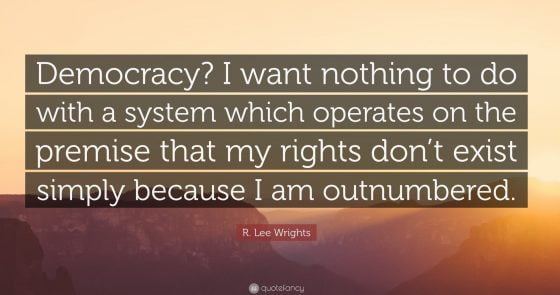This article was originally published by Mihai Macovei at The Mises Institute.
So-called populist political parties and politicians gained considerable traction with Western voters in recent years, despite being dismissed in many cases as “a threat to democracy” and “extremists” by mainstream politicians. With the election of Donald Trump in the US and of Javier Milei in Argentina, the surge in polls and electoral wins of right and far-right parties in several European countries sent shockwaves through the political establishment.
The Cambridge Dictionary defines populism as “political ideas and activities that are intended to get the support of ordinary people by giving them what they want.” If populism caters to the wishes of the people, then how could it be a threat to democracy? This sounds paradoxical together with the blunt refusal of mainstream parties to adjust their political agendas to messages that resonate well with ordinary people. One is left wondering what might be a bigger threat to democracy and individual freedom—the so-called populists who shout out loudly people’s discontent or the establishment that tries to suppress unwelcome views?
Populism and Its Recent Rise
Populist parties usually position themselves as champions of the ordinary people in their struggle against mainstream parties and self-serving “elites.” They often target the political, economic, cultural, and media establishment, accusing their leaders of prioritizing their own interests over those of the people. Populists promise a voice for those who feel left behind by traditional politics and try to address their grievances. As the perceived solutions to these grievances can be either left—or right-wing policies, populist politicians can operate across the entire political spectrum.
Trump came to power by speaking directly to working-class strongholds and firing up voters who felt left behind by globalization. He routinely accused the political elites in Washington of mismanagement and serving their own interests, as illustrated by his slogan “Drain the Swamp.” Trump also challenged the mainstream mass media calling it the “enemy of the American people.” Milei also put forward an “antipolitical caste” and antiglobalist agenda in addition to promising a market shock therapy to solve Argentina’s economic crisis.
In Europe, Italy’s right-wing parties came to power by harnessing popular discontent with mass immigration, woke propaganda, and the Brussels bureaucracy. The same dissatisfaction with immigration pushed Dutch voters to vote for the right-wing proponent Geert Wilders and led the German public to increasingly embrace the right-wing Eurosceptic, anti-inflation, and antiwar agenda of the “Alternative for Germany” party. Similar popular grievances also won Viktor Orbán a fourth consecutive mandate as prime minister in Hungary and brought Robert Fico back to power in Slovakia.
The growing appeal of populists to Western voters is unquestionable. Despite countless legal battles and campaigns to discredit him, Donald Trump holds a narrow lead in polls against Joe Biden. In Europe, recent polls reveal a surge in support for right-wing populists which could dramatically change the political landscape in the European Parliament after the June elections. The current pro-European mainstream parties may still cobble together a majority, but the risk of having a European Parliament with populist, mostly Eurosceptic parties in the driving seat is real. This would hinder green policies and reduce support for the war in Ukraine. Portugal was the latest to experience a phenomenal surge of right-wing political forces in the March elections.
The Reaction of Mainstream Parties
The European establishment has always taken the populist threat very seriously. Mainstream parties usually went for pre—and post-electoral coalitions to hold more radical parties at bay through a “cordon sanitaire.” For the June elections, Europe’s center-right and leading party—the European People’s Party—proposed Ursula von der Leyen for a second term at the European Commission and is trying to ensure broad postelectoral support from socialists and liberals in case it wins the vote.
Von der Leyen’s program does not differ much from the main policies conducted during the first mandate, with a focus on strengthening the European Union’s defense, and security and supporting Ukraine in the war against Russia, improving business competitiveness, and pushing through more green policies. Yet, the threat of the populist opposition and widespread protests from farmers and businesses forced her to present the green agenda as a lower priority. She also announced a tougher stance on mass immigration. This shows that, to some extent, pressure from populist parties is bringing to the fore people’s wishes, strengthening democracy rather than undermining it.
But the thrust of the establishment’s agenda remains broadly unchanged, although popular dissatisfaction with the latter has grown exponentially. After more than two years of conflict in Ukraine, popular support for the war and confidence that Ukraine would emerge victorious have eroded significantly both among Americans and Europeans. Discontent with green policies has also soared across Europe, and the more expensive the proposed measures get, the less support they garner. It is easier to understand now why mainstream politicians prefer to apply the populist label to parties that dispute their agenda rather than trying to combat divergent views with arguments.
In the traditional discourse of mainstream parties, the so-called populist forces are primarily blamed as being a threat to democracy by following an authoritarian form of politics. But this is not necessarily true because populism can designate either democratic or authoritarian movements. Authoritarian populism characterized by extreme nationalism and scapegoating of marginalized groups occurred primarily in Latin America in the 1990s and 2000s but not in the West where democratic foundations are more solid.
The negative impact on the democracy of populists who shared power or dominated governments in European countries like Austria, Greece, Italy, Poland, and Slovakia has been rather insignificant. Viktor Orbán has probably been accused the most of undermining democracy in his country. The European Parliament has even declared that Hungary is “no longer a democracy.” But it is not clear to what extent this is just a retribution for his strong Eurosceptic and antiwar positions because he still enjoys wide domestic support. Moreover, surveys show that Hungarians have more confidence in the national parliament and government rather than in the European Union.
Another common complaint against populist leaders is that they tend to dislike the complicated democratic systems of modern government and prefer direct democracy, such as referenda. Yet, the direct consultation of people on important issues seems more like a virtue than a shortcoming as governments tend to overlook more and more their electoral mandate once elected. This point has also been put forward by political scientists such as Yves Mény and Yves Surel, who claim that populism is an expression of the primacy of the people’s sovereignty in the political system. Also, Ernesto Laclau acknowledged the democratic benefits of populism by which marginalized groups and newborn political movements challenge dominant power structures. Lately, populism has been viewed more favorably by some mainstream pundits and described as “an illiberal democratic response to undemocratic liberalism.”
In our view, this dichotomy between democratic rights and other civil liberties is a false argument. The two are interconnected and based on the fundamental right to private property. Without observing individual freedom, including a clear delimitation of property rights, there cannot be a functioning democracy. At the same time, democracy is not, per se, a guarantee for the full respect of individual liberties either.
A Libertarian View
Murray Rothbard went to the crux of the matter when he developed a systematic theory of liberty. The foundation of individual freedom in his libertarian framework is people’s natural rights expressed through absolute property rights. John Locke elaborated the concept of individual “natural rights” in the seventeenth century, referring to every person’s ownership right of his own body and of the work of his hands that transformed nature before anyone else did. The American Revolution had been largely inspired by libertarian and Lockean ideas, and the Declaration of Independence talked about the people’s unalienable natural rights. But natural rights were incompatible with absolute state power and did not go well with either democratic or socialist systems. They were gradually replaced by the watered-down concept of “human rights” which depend on arbitrary interpretation and enforcement by state courts and judges. Thus, property rights are not absolute anymore but at the whim of governments.
In conclusion, the respect of modern “human rights” is not enough to ensure the protection of fundamental individual liberties because they relativize property rights. Today’s main grievances of Westerners—such as uncontrolled immigration, burdening taxation and green regulations, and government participation in international military conflicts—represent a blatant invasion of individual property rights. And yet, paradoxically, political parties that support these grievances are labeled as antidemocratic and extremist by the establishment. This is a clear sign of the ailing democracy and individual freedom in the West.











0 Comments